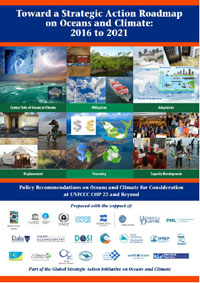This comprehensive set of policy recommendations on oceans and climate for consideration at the United Nations Framework Convention on Climate Change 22nd Conference of the Parties and beyond is aimed at recognizing the central role of oceans in climate and the need to implement stringent reductions in greenhouse gas emissions to avoid disastrous consequences for coastal and island communities, marine ecosystems, and ocean chemistry. The recommendations from the International Expert Working Group on Oceans and Climate address mitigation, adaptation, displacement, financing, and capacity development.With respect to mitigation, the authors recommend implementing “blue carbon” policies, reducing carbon emissions from ships, developing ocean-based renewable energy, and considering (long-term/no-harm) ocean-based carbon capture and storage. They also encourage all nations to reduce carbon emissions so that the Paris Agreement to limit emissions to well below 2 degrees Celsius can be achieved. With respect to adaptation, the authors recommend implementing ecosystem-based adaptation strategies through integrated coastal and ocean management institutions at national, regional, and local levels to reduce the vulnerability of coastal/ocean ecosystems and human settlements and to build the management capacity, preparedness, resilience, and adaptive capacities of coastal and island communities. With respect to displacement of coastal and island populations as a result of climate change, they recommend international law changes to clarify definitions, rights, and procedures for climate-induced refugees and migrants, including development and implementation of appropriate financing measures. With respect to financing adaptation and mitigation efforts, they recommend directing a significant portion of the current climate funds to coastal and SIDS issues and developing supplementary financing to support adaptation and mitigation methods through innovative approaches and partnerships. Finally, with respect to capacity development, they recommend building up knowledge, tools, and scientific and political expertise to empower people to implement mitigation and adaptation measures, to increase adaptive management capacity, to create early warning systems, and to institute disaster risk reduction. They also recommend developing knowledge management mechanisms to share knowledge among all countries.
 Issues & Projects
Issues & Projects

